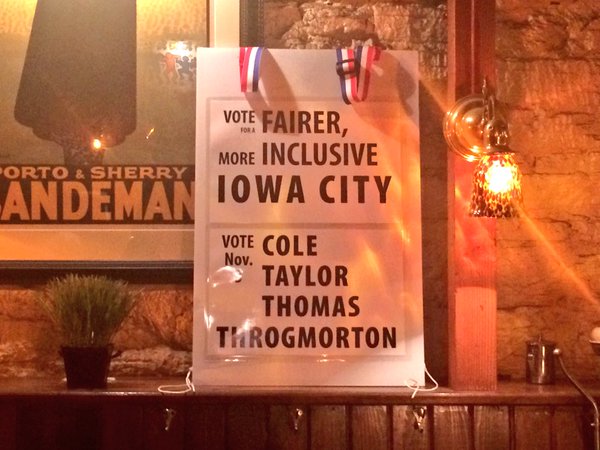As always, post a comment or drop me an e-mail (desmoinesdem AT yahoo.com) if I’ve left anything out.
Monday, December 15:
One Iowa and Lambda Legal are organizing a townhall forum to celebrate and discuss the oral arguments before the Iowa Supreme Court in the landmark Varnum v. Brien case. RSVP not required for townhall forums.
Council Bluffs Townhall Forum
Monday, Dec. 15, 2008 – 6:30-7:30 PM
St. Paul’s Episcopal Church, 22 Dillman
For more information, contact One Iowa at organize@oneiowa.org or 515-288-4019
From the Iowa Environmental Council’s e-mail bulletin:
Missouri River Group Meeting
December 15-18, Omaha
The new Missouri River Recovery Implementation Committee, also known as MRRIC, has scheduled another meeting. The Committee is made up of Federal, State, and Tribal Representatives as well as stakeholders, with an interest in the river, from throughout the basin. The purpose of MRRIC is to offer guidance to the Army Corps of Engineers and the Fish and Wildlife Service on future management of the Missouri River. The Committee will offer advice on the recovery process for the three Endangered Species on the river. Those include; the interior least tern, piping plover and the pallid sturgeon. MRRIC will also look at possible social, cultural and economic impacts of the recovery process on people in the basin. The next meeting of MRRIC will be December 15th to the 18th in Omaha. To learn more and to get involved, go to: www.mrric.org
Tuesday, December 16:
Reservations are due for the Interfaith Alliance of Iowa’s Crossroads luncheon on Friday (see below).
From the Center on Sustainable Communities:
Eco-Friendly Home Product Showcase
DATE: Tuesday, December 16, 2008
TIME: 11:30am – 1:30pm
LOCATION:
Meredith Corporation
1716 Locust St.
Des Moines, IA
Meredith Corporation is inviting all COSC members to a showcase of
the latest and greatest environmentally friendly home products.
Join us at a green trade show on
December 16th from 11:30 a.m. to 1:30 p.m.
at Meredith Corporation, 1716 Locust St.
Be sure to stop by to learn about what’s new in green building. If you plan to attend,
please RSVP to Jenny McCoy at Jennifer.mccoy@meredith.com. She can
provide more information about the event location and parking.
Center On Sustainable Communities
219 1/2 Fifth Street, Suite A
Historic Valley Junction
West Des Moines, Iowa 50265
(515) 277-6222
1000 Friends of Iowa is presenting the 2008 Best Development Awards:
* New Residential: Upper Mississippi Valley Redevelopment Company, 1820 East Thirteenth Street, Village of East Davenport Development in Davenport, Iowa
* Renovated Residential: The HEART Program’s Washington Street Project in Dubuque, Iowa
* Renovated Commercial/Civic: M+ Architects, ISU Design West development in Sioux City, Iowa
* New Commercial/Civic: RDG Planning & Design, Marion Arts and Environmental Center at Lowe Park in Marion, Iowa
* Mixed Use: LADCO Development, Village of Ponderosa in West Des Moines, Iowa
* Leadership: City of Iowa City, Iowa City Subdivision Code in Iowa City, Iowa
The awards ceremony will be held on December 16, 2008 at 6:30 p.m., at RDG Planning & Design, 301 Grand Avenue, 2nd floor in downtown Des Moines, IA 50309. Parking is available behind the building.
One Iowa and Lambda Legal have another townhall forum scheduled:
Sioux City Townhall Forum
Tuesday, Dec. 16, 2008 – 6:30-7:30 PM
Public Library, Glesson Room, 529 Pierce St.
RSVP not required, but for more information, contact One Iowa at organize@oneiowa.org or 515-288-4019
Wednesday, December 17:
It’s the last day to submit nominations for Talking Points Memo’s “Golden Duke Awards.” For more information, click here:
http://www.talkingpointsmemo.c…
Friday, December 19:
From the Interfaith Alliance of Iowa:
Migration, Marriage, and Much More!
Making a Difference
Judie Hoffman , TIA Iowa Action Fund Lobbyist
Brad Clark, One Iowa
Brenda Kole, Planned Parenthood of Greater Iowa
Judie Hoffman and Friends will discuss the 2009 Legislative Agenda of The Interfaith Alliance of Iowa Action Fund and other progressive ally organizations. Learn about the issues and how you can join with other progressive voices of faith & goodwill from across the state and make a difference.
The Crossroads monthly luncheon is Friday, December 19 from 11:45 am – 1 pm at Plymouth Congregational Church, 42nd & Ingersoll Avenue, Des Moines.
Reservations are required to attend Crossroads and must be received by noon on Tuesday, December 16. Cost is $8 and is payable at the door. If you make a reservation and are unable to attend, payment for the reservation is appreciated.
For more information or to make a reservation, call (515) 279-8715 or email tiaiowa@dwx.com.
Sunday, December 21:
From the Iowa Renewable Energy Association:
Join I-Renew to Celebrate Renewable Energy on Winter Solstice. Festivities include: Live Music! Free Giveaways! Silent Auction with great renewable holiday gifts! Discussion and fun with like-minded folks interested in renewable energy! The event is on Sunday December 21 at 6:00 PM at the Mill Restaurant, 120 E. Burlington St. Iowa City. The funds raised at the event will go toward I-Renew’s work educating Iowans about sustainable energy production and use. If you would like to donate silent auction items, help promote the event, get more information about sponsorship opportunities, or have any questions, please contact the I-Renew office at:(319) 643-3160 or by emailing irenew@irenew.org.
Continue Reading...


